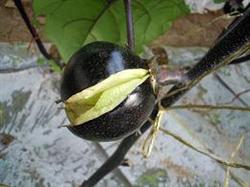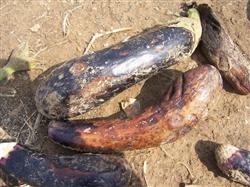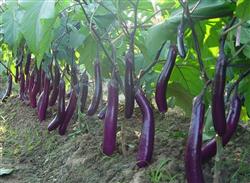Why does the top of eggplant crack in summer?

Why does the top of eggplant crack in summer? Please introduce the reasons and control methods of eggplant cultivated in summer, the top (navel) is often cracked, the seeds are exposed, and the fruit is no longer expanded. Serious plots occur as much as 1 stroke 4, seriously affecting production and commodity value. The cracking at the top of summer eggplant is mainly caused by calcium deficiency, which is mainly caused by soil calcium deficiency, heavy rain leaching, excessive nitrogen fertilizer, excessive air humidity and serious diseases. The soil was dry in the early stage of fruit development, resulting in the Lignification of the pericarp. In the later stage, the fruit expanded rapidly in case of heavy rain or uneven watering, and the pericarp could not grow accordingly and cracked. However, the main reason for the cracking at the top of most eggplants is the lack of calcitonin. The causes and prevention measures of calcitonin deficiency are as follows: first, the causes of calcitonin deficiency. Lack of calcium fertilizer. Calcium deficiency in soil, especially in continuous cropping plots, does not pay attention to the application of calcium fertilizer, resulting in calcium deficiency. This phenomenon is more prominent in greenhouse and greenhouse. two。 Too much nitrogen. Excessive application of nitrogen fertilizer in soil results in excessive accumulation of ammonium nitrogen and inhibits the absorption of calcium. 3. Excess water. Excessive watering or heavy rain leaching loses the available calcitonin in the soil, resulting in calcitonin deficiency. It happens badly when it is rainy in summer. 4. Growth disorders. That is, the poor water circulation in the plant leads to the obstacle of growth. This phenomenon can be divided into two situations: one is that the soil is dry and the plant lacks water supply, and calcium can not be absorbed and supplied; second, after heavy rain or watering in summer, the air humidity is extremely high, which inhibits the transpiration of the plant. the root system can not absorb water and calcium normally, resulting in calcitonin deficiency. 5. Diseases and insect pests. In the later stage of growth, due to negligent management, serious diseases and insect pests, especially plants with Verticillium wilt, Fusarium wilt, root rot, root-knot nematode disease, and plant aging, the absorption function of roots decreased greatly, resulting in calcitonin deficiency. Second, prevention and control measures of cracking. Apply more calcium fertilizer. Pay attention to the application of calcitonin fertilizer with high calcitonin content in soil. two。 Water properly. Water in time during drought, but not too much. Drain waterlogging in time on rainy days to prevent flooding. 3. Strengthen management. In addition to doing a good job in pest control, natural brassin-Shuofeng 481 solution was sprayed twice every 20 days to promote root growth and development and improve absorptive capacity. 4. Fertilize outside the root. When the air humidity is high in the rainy season, 0.3% ammonium-calcium-magnesium solution is used for extra-root topdressing once every 3-7 days. Click to get more eggplant planting techniques click to get more vegetable planting techniques
- Prev

Which diseases and insect pests need to be controlled by eggplant in summer?
Which diseases and insect pests need to be controlled by eggplant in summer? Please introduce the need to control diseases and insect pests of eggplant in summer, there are the following for reference: first, eggplant pest control 1. Red spider: agricultural control should always keep the soil moist, avoid excessive drought, remove weeds and litter in time, and reduce the source of insects. Chemical prevention and control should be strengthened.
- Next

How can summer eggplant be planted with high yield?
How can summer eggplant be planted with high yield? Please introduce the summer eggplant can be planted according to the following methods: 1. Early sowing at the right time, sparsely sowing strong seedlings and wheat stubble eggplant is generally from late April to late May. Choose the land with high dryness and good drainage to raise seedlings, it is necessary to build a shady shed to prevent rain and sun exposure. The variety chooses resistance.
Related
- Where is it suitable to grow horseradish in China? it is expected to see the middle altitude horseradish in Alishan.
- How to prevent tomato virus disease reasonably? (Control methods included)
- Many people like to plant towel gourd on the balcony. What are the main points of this method and management?
- What crops can chili peppers be mixed with?
- Fertilization techniques and matters needing attention in Tomato
- What are the grafting techniques for peach seedlings in spring?
- Harm and control methods of root swelling disease of Chinese cabbage
- What are the pests of sweet potatoes? How to prevent and cure it?
- Symptoms, causes and Control methods of navel Rot in Tomato
- The cause of "Cucumber rotten bibcock" in Farmers' planting Cucumber and its Control Plan

